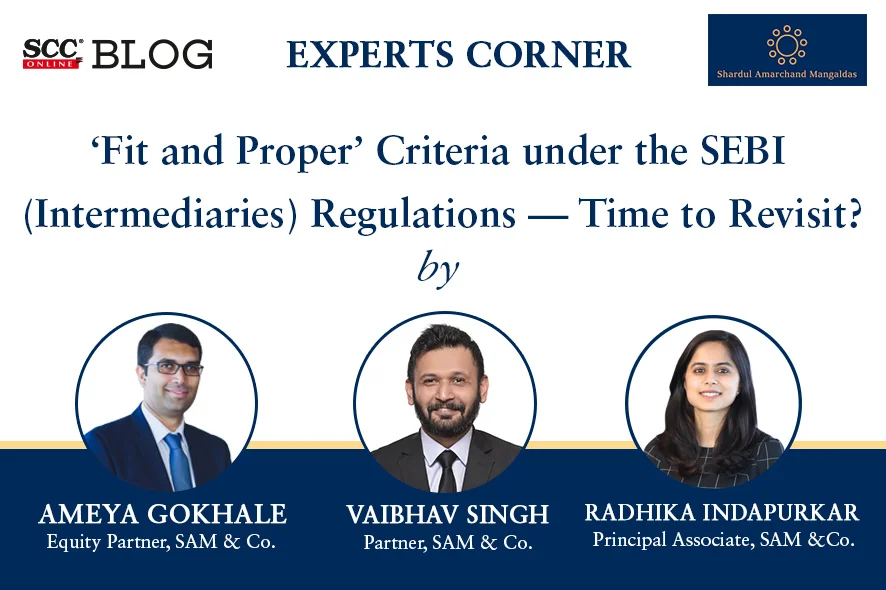In November 2021, the Securities and Exchange Board of India (SEBI) amended1 the ‘fit and proper’ person criteria under Schedule II of the SEBI (Intermediaries) Regulations, 2008. The amended criteria inter alia provide for automatic disqualification of intermediaries and/or their directors, promoters, key managerial personnel (KMP) and the like. These grounds, among others, include (i) the filing of a criminal complaint or information under Section 154 of the Code of Criminal Procedure, 1973 by SEBI; and (ii) the filing and pendency of a charge sheet by any enforcement agency in matters concerning economic offences.
The amended criteria further provide that in the event a principal officer, director or KMP of an intermediary is so disqualified, the intermediary is required to replace the principal officer, director or KMP within thirty days from the date of such disqualification. Further, if a promoter or “person holding controlling interest” over the intermediary fails to satisfy the ‘fit and proper person’ criteria, the intermediary must ensure that such person does not exercise voting rights and divests their holding within six months from the date of disqualification. Unless these conditions are complied with, within the prescribed timelines, the intermediary itself shall entail disqualification.
There are well over 5000 intermediaries registered with SEBI and therefore there is no doubt that the amended regulations will have wide and far-reaching effects, especially when SEBI has undertaken to punish intermediaries and their KMP on the mere possibility that they may be ultimately convicted.
Other Indian statutes and jurisprudence
A complaint or charge-sheet is not a substantive piece of evidence. A charge-sheet is merely a report of the investigating officer. At the stage of filing of a complaint or a charge-sheet there is no conclusive determination of guilt of the accused by a court of law. In fact, at such a stage, the accused person is yet to be called upon to defend himself. Therefore, disqualifying a person operating in the securities market on the basis of mere filing of a complaint or charge sheet, seems prima facie arbitrary.
Statutes governing Chartered Accountants2, Company Secretaries3 and public representatives under the Representation of the People Act, 1951, provide that a person would not be entitled for registration if they have been convicted by a competent court for offences specified within the respective Acts. Further, under the Advocates Act4, no person is admitted as an advocate if they have been convicted of certain offences specified thereunder. The Companies Act5 is no different and provides for disqualifications for directors and auditors only upon conviction.
In a country where even elected representatives, directors and company secretaries are disqualified only when convicted, it can be said that the exceedingly high standard set by the SEBI is irrational and unreasonably restrictive, and thereby in derogation of Articles 14 and 19(1)(g) of the Indian Constitution.
Amended regulations as compared with international standards relating to the ‘fit and proper person’ criteria
Jurisdictions like Singapore, Canada, the United Kingdom, Australia, the European Union, Mauritius and the United States of America consider pending criminal proceedings only as criteria (and not grounds for automatic disqualification) while determining the fit and proper status of a person seeking registration as an intermediary. Automatic disqualification merely based on pending criminal proceedings against an intermediary or its KMPs etc. is uncommon.
The International Organisation of Securities Commissions (IOSCO), which is an association of organisations that regulate the world’s securities markets, published a ‘Fit and Proper Assessment — Best Practice Report’ in December 2009. According to this report, record of conviction bars a person from being registered as an intermediary. It is curious that SEBI, despite being on the IOSCO Board, has chosen to not formulate its own regulations in line with these international standards.
Recent view
Recently, an order of the Insolvency and Bankruptcy Board of India (IBBI) declaring a registered valuer to be not ‘fit and proper’ merely due to the pendency of criminal proceedings has been stayed by the Bombay High Court.6 Similarly, automatic disqualification on the mere filing of a complaint by the SEBI itself or filing and pendency of a charge sheet in an economic offence violates the cardinal principle that every person ought to be presumed innocent unless proven guilty.
The obligations imposed upon intermediaries to replace their promoters, directors, KMPs, etc. to avoid automatic disqualification as per the amended ‘fit and proper’ person criteria are also onerous and not merely in violation of the Constitution.
In light of the above, it would bode well for the SEBI to revisit the issue and understand the large-scale impacts that such requirements may have on the functioning of the securities market as a whole.
† Equity Partner, Shardul Amarchand Mangaldas & Co., Mumbai
†† Partner, Shardul Amarchand Mangaldas & Co., Mumbai
††† Principal Associate, Shardul Amarchand Mangaldas & Co., Mumbai
1. Securities and Exchange Board of India (Intermediaries) (Third Amendment) Regulations, 2021.
2. Chartered Accountants Act, 1949.
3. Company Secretaries Act, 1980.
6. Vishwanatha Sridhar Prabhu v. Union of India, Civil Writ Petition No. 10440 of 2022, order dated 12-01-2023.



